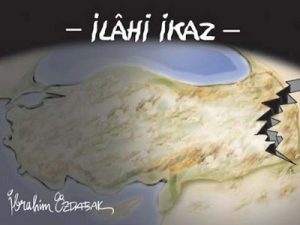The recent earthquake in Turkey’s predominantly Kurdish province of Van not only caused loss of life and damage, it also exposed the country’s political and ethnic fault lines.
In the last two decades, there were ten earthquakes with a magnitude of six or more in Turkey. In 1999, two powerful earthquakes struck country’s northwestern provinces, produced massive damage, cost billions of dollars and left more than eighteen thousand dead.
The latest natural disaster on 23 October reminded the Turkish people, yet again, that they live in a major seismic zone. It also revealed their government’s uncoordinated aid efforts and the country’s growing ethnic tensions.
Since 1999 Turkish state institutions have significantly improved their emergency response policies. Similarly, nongovernmental relief efforts were quick and more organized. Civil society organizations and local municipalities launched numerous aid campaigns throughout Turkey. Major television networks ran special fund-raising programs, collecting over ninety million dollars for quake victims.
Yet, the Justice and Development Party (AKP) government’s unwillingness to accept foreign help in the immediate aftermath of the disaster and its overly self-confident stance caused considerable criticism. By initially rejecting offers from countries with extensive experience in search and rescue operations, Ankara risked the lives of many victims. Additionally, a succession of contradictory statements by the authorities pointed to abiding communication problems. More to the point, a live broadcast from the earthquake zone aired on a national television network exposed the mistrust between local and central authorities. The Governor, who is appointed by Ankara, and the Mayor, who is a member of the pro-Kurdish Peace and Democracy Party (BDP), participated in the show. The mayor complained that he was not invited to coordination meetings, while the governor, claiming that an invitation is not needed, said that it was the mayor who was not present in meetings.
There is suspicion in Ankara that pro-BDP activists may try to foment hostility against the government and the outlawed Kurdistan Workers’ Party (PKK) may try to incite unrest among earthquake victims. In fact, Turkish Prime Minister Tayyip Erdoğan accused the region’s BDP municipalizes of hindering relief efforts. He said “those who get quickly organized when it comes to vandalism and throwing stones and Molotov cocktails at the police are nowhere to be seen when disaster strikes,” in reference to mass rallies organized by the BDP in eastern cities in protest to the detention of members of the KCK (the alleged urban wing of the PKK) and the military operations against the PKK.
It is often said that disasters help build strong bonds between rival communities. In 1999, earthquake diplomacy opened a new chapter in Greco-Turkish relations. Decades of mutual hostility eased rapidly when the two nations helped each after successive earthquakes. Increased sympathy eventually paved the way for improved bilateral relations. Some hoped the same for Turkey’s internal conflict after last week’s earthquake. Yet, what actually surfaced was Turkey’s political and ethnic fault line, in its worst form.

An image that appeared in the October 24, 2011 issue of daily newspaper Yeni Asya reading "divine warning".
A caricature in the conservative daily newspaper Yeni Asya showing a map of Turkey divided by a fault line stretching through Eastern Turkey read “divine warning,” a clear reference to the conflict in that region. And in the words a host on national television, “First they throw stones [at police] and kill [soldiers] in the mountains…but when they are in trouble, they call for the army and the police to come to their help.”
Both the newspaper and the television host later issued apologies for their comments. Nevertheless, the caricature and video have already gone viral in the hands of the propaganda machine.
Pro-Kurdish media is carrying out an intense media campaign against the AKP government. News stories claim that some Kurds in Erciş, the epicenter of the earthquake, were denied aid, while others claim that the government is deliberately postponing relief and that only BDP municipalities and Kurdish NGOs are sending help. Roj TV, the propaganda wing of the outlawed Kurdistan Workers’ Party PKK, reportedly called on local Kurds to get out to the streets and protest, while claiming that the wounded were denied hospital care and people were deliberately abandoned under the rubble. The accuracy of such reports is always controversial, but they no doubt depict the miscommunication, distrust, and intensity of efforts to create ethnic confrontation out of a disaster.
The new Turkish parliament is taking baby steps to draft a new social contract and the government is overhauling Turkey’s decades-old counterterrorism strategy. The PKK, seeing its operational capabilities and financial resources constrained, is assuming new tactics to drain the hopes for a peaceful solution to the country’s decades-old conflict.
Only a week after the quake, there was an attack against the police followed by a suicide bombing targeting an AKP local office in eastern Turkey that left six dead. Prime Minister Erdoğan may be right in his frustration with BDP’s unwillingness to cooperate. There are certainly those who would be more than happy to find a reason to manipulate and mobilize the local population against the government. The Van earthquake should be seen as an opportunity by Ankara to realize how fragile Turkey’s ethnic faults are, and address them. Earthquake trauma has long-term effects on the population, and Ankara should refrain from its habitual confrontational discourse and instead aim at lowering tensions. Finger-pointing does the opposite.
A version of this article was originally published at Jadaliyya.com.






